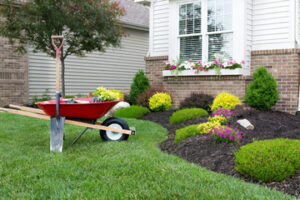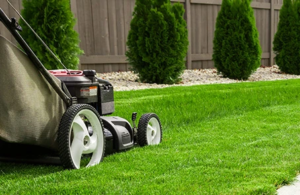Landscapers Harrisburg PA use their horticulture, ecology and design knowledge to transform outdoor spaces. They may work on public or private land. They install and construct plants, trees, walkways, ponds and water features. They also build and repair lawns, fences and retaining walls.
Living with a landscaper has its perks, but it can be challenging to find balance. One such couple, Brett and Stephanie Lemcke, discuss how they make it work for their family.

Landscapers use their knowledge of horticulture, plant selection and landscape design principles to create visually appealing and functional outdoor environments that enhance the value of residential and commercial properties. They may specialize in a specific type of landscaping, such as lawn care or flower gardening, or work on a broad range of projects from designing outdoor living spaces to installing hardscape features like patios, decks, walkways and retaining walls.
Creating landscape designs requires both technical skills and creativity. A landscaper must be able to visualize how a finished product will look, sketch out layouts and determine how plants will grow together. They also need to understand the fundamentals of engineering, such as water drainage and soil composition. Detailed plans are essential for large-scale projects, and landscapers often charge additional fees to create them.
In addition to designing’soft’ landscaping elements like trees, shrubs and flowers, landscapers can also install ‘hardscape’ features like patios, decks, pathways, retaining walls, fences and outdoor lighting. Using their experience in both the ‘hard’ and’soft’ side of landscaping, they can make sure that all components are properly installed and integrated to create a cohesive, balanced outdoor environment.
Landscaping is a physically demanding job, and it’s important for landscapers to be in good physical condition to handle long days of digging, planting and moving equipment. It’s also necessary to have excellent problem-solving abilities to tackle challenges that arise during a project, such as when a tree falls over or an irrigation system malfunctions. Good communication skills are also crucial for working with clients to understand their vision and bring it to life.
While having formal education in a related field isn’t always required for this role, landscapers who want to advance their careers should consider taking classes or getting on-the-job training in horticulture, botany, landscaping or environmental science. Additionally, membership in a professional landscape organization can help landscapers stay abreast of the latest advancements in the industry and connect with other professionals. These groups can also provide a source of referrals for new business.
Installation
As the name suggests, landscapers work with a wide range of plant life to create aesthetically pleasing and functional outdoor spaces. These projects can involve planting and transplanting flowers, trees, shrubs, or grasses, laying out irrigation systems to promote healthy growth, or even constructing a deck, patio, or retaining wall. As such, this is a physically demanding role that requires good physical fitness and attention to detail.
Before starting any landscaping project, landscapers will often spend time assessing the area to determine what types of plants would work best with the site and climate conditions. During this process, they may also be called upon to make adjustments to the land’s elevation or drainage, lay new turf, or install other features like water fountains or outdoor lighting.
Once the landscaping has been installed, landscapers are then responsible for the ongoing maintenance of the plant life and hardscape features they’ve installed. This includes mowing, trimming, pruning, fertilizing, and watering as needed to keep the area looking its best. It also involves addressing any insect or pest problems that may occur.
Landscapers also perform lawn care tasks, including mowing, edging, aerating, overseeding, and dethatching to maintain the health and appearance of the turfgrass. They may also use herbicides or pesticides if necessary to control unwanted weeds.
Other common duties include installing outdoor lighting, water fountains, or fire pits. They may also be tasked with building or repairing outdoor structures, such as fences, sheds, decks, or retaining walls. They may also be asked to manage the installation of hardscape features, such as stonework and walkways.
Landscapers must be able to work well in a team and communicate effectively with clients, architects, engineers, and other professionals involved in the planning and construction of landscaping projects. They should have a strong understanding of the principles of design and be able to create designs that are both aesthetically pleasing and practical. They should also be familiar with the latest tools and equipment to ensure they can complete their tasks efficiently and accurately.
Maintenance
Even the best landscape design can quickly lose its impact if it isn’t regularly maintained. That’s why landscapers offer a variety of maintenance services to keep your commercial property looking its best.
The most common landscape maintenance services include mowing, trimming, weeding, pest control, and fertilization. Depending on your needs and budget, you can add on lawn aeration, shrub pruning, and hedging to your service plan.
Proper irrigation system care and maintenance is a critical part of landscape maintenance, too. Regular inspections prevent leaks and other problems that reduce water efficiency and cost. In addition, adjusting your irrigation schedule based on seasonal weather changes helps conserve water while ensuring that all plants get adequate hydration.
Trees and shrubs benefit from regular pruning to remove dead blooms, maintain shape and size, and encourage growth. This is a critical part of your plant health and is often done in the spring or fall. A professional can ensure that your shrubs and hedges are pruned at the optimum time of year to promote plant health.
In areas with a lot of trees, it’s important to perform routine leaf cleanup. Your landscapers will use high-powered blowers and vacuums to rake up and haul away all that fallen foliage. This not only keeps your property clean and attractive, but also makes it safe for pedestrians and vehicles.
For larger properties with a lot of hardscape, your landscapers can perform regular sweeps and power washing to clear walkways of debris and dirt. This is a great way to maintain the visual appeal of your commercial property while also keeping it safe and functional.
Whether you’re a retail center, logistics and distribution center, office complex, or apartment complex, your business depends on the functionality of your outdoor spaces. You need your tenants to be able to move about your property without worrying about tripping or slipping on uneven sidewalks or other surfaces. A well-maintained commercial landscape is an investment that will continue to pay dividends for years to come.
No matter the type or size of your property, you can trust the expertise and reliability of the professionals at Elevated Seasons for all your landscape maintenance needs. Contact us today to find out more about our complete maintenance offerings and schedule your free consultation.
Sales
A landscaping business’ sales can fluctuate throughout the year, but a strong, consistent pipeline helps businesses grow. Landscapers should use a customer relationship management (CRM) system that offers lead scoring, marketing automation, and integration capabilities to effectively manage their sales.
A good CRM can help landscapers understand which leads are most likely to convert to customers, and focus on generating quality traffic. They can also use it to track their progress, and set realistic goals based on their current abilities and the potential of each individual lead.
Landscaping companies can improve their sales performance by leveraging their expertise in design, installation, and maintenance. By developing a client base, they can increase their revenue and build long-term relationships. Investing in sales training also allows them to build stronger sales skills and close more deals.
Larger landscaping companies may employ sales account managers, who have a variety of responsibilities including client/vendor relationships, project oversight, new business development, and upselling. These positions typically report to a sales manager, who oversees the performance of other salespeople and business development activities.
Landscapers can also utilize social media to showcase their work. They can encourage previous customers to share photos and reviews on their pages, which will help attract more prospective clients. Additionally, they can add photos of their completed projects to their websites and other media. This will help their prospects visualize the outcome of a landscaping job and make an informed decision.
Whether they are adding a water feature, outdoor kitchen, or an expansive patio area to a home, landscaping professionals will collaborate with their customers to determine the best solution for each space. They will take into account the existing architecture, site conditions, and budgetary restrictions. In some cases, they may also provide 3D modeling of the proposed design to demonstrate how it would look.
Professionally designed and maintained landscaping increases property value, while providing a healthy environment for homeowners and their families. In addition to providing a beautiful setting, the services of a qualified landscaping company can help to protect against soil erosion and flooding, support local wildlife, and minimize water usage.


